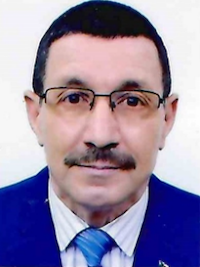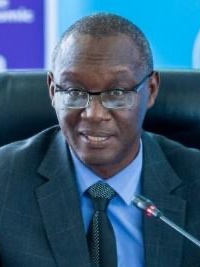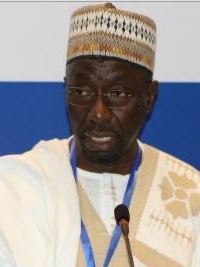Following the decision made by the High Level Policy Review Seminar (HLPRS) held in Aswan, November 2007, to support the improvement of the managerial procedures of AFRA, to increase effectiveness and efficiency and to promote full ownership of its programmes by AFRA Member States, the HLPRS proposed that the AFRA-FMC should be replaced by three committees to address high priority needs of managing the AFRA Programme.
The AFRA Programme must lead to the sharing of resources, knowledge and expertise among the participating countries, the transfer of technology available in advanced countries to countries where such technology is needed; and the creation of regional capabilities that, once developed, will, in turn, lead to further regional cooperation. This demands vision, commitment and effective management.
The AFRA Programme is composed of a set of cooperative projects which are endorsed by at least three Member States. An AFRA project is the vehicle that translates external and internal funds into a development objective designed to meet identified human needs of end-users and has a significant social and economic impact. It must be technically sound and should be based on a cost-benefit analysis.
The project has a time limit for producing the expected achievements, a workplan, a schedule of inputs and outputs and a budget. AFRA projects must emphasise the following elements:
- It entails mutual collaboration and full involvement of participating countries in the design, formulation and implementation of project activities. Projects should make use of the existing expertise and facilities in the participating countries. Inputs, such as the provision of experts and training, should be drawn as far as possible from within the participating countries or other developing countries;
- Projects must respond to the needs of participating countries and address serious problems common to them. They should have a clear inter-country dimension, a limited duration and attainable and measurable objectives and significant impact;
- Efforts must be combined to implement a small number of projects within high priority areas to which participating countries would be prepared to contribute resources and which would also attract outside resources, leading to demonstrable mutual benefit.


 Professor Maryam Aminu is the Dean of the Faculty of Life Sciences at Ahmadu Bello University in Zaria, Nigeria. She is a distinguished academic with extensive experience in microbiology, having earned her B.Sc., M.Sc., PGDE, and Ph.D. degrees from the same institution. With nearly 27 years of service at ABU, she has held various roles, including Deputy Dean and current Head of the Department of Microbiology. She is a UNESCO-L’ORÉAL Fellow and a Senior Fulbright Scholar.
Professor Maryam Aminu is the Dean of the Faculty of Life Sciences at Ahmadu Bello University in Zaria, Nigeria. She is a distinguished academic with extensive experience in microbiology, having earned her B.Sc., M.Sc., PGDE, and Ph.D. degrees from the same institution. With nearly 27 years of service at ABU, she has held various roles, including Deputy Dean and current Head of the Department of Microbiology. She is a UNESCO-L’ORÉAL Fellow and a Senior Fulbright Scholar.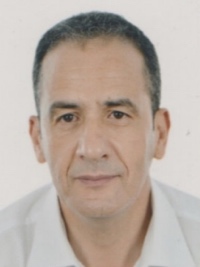
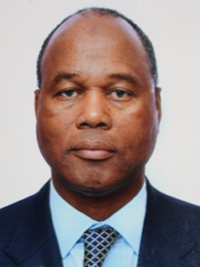 Karim Tounkara holds a Doctor of Veterinary Medicine (DVM) degree (1978) and a Ph.D. in Microbiology (1982) from Moscow Veterinary Academy. He has certificates in Virology (Washington State University – 1987), Epidemiology, Statistics, and Economics (University of Reading, UK – 1991), as well as ELISA and Molecular Biology Techniques (IAEA - 1995). He is fluent in French, Russian, and English.
Karim Tounkara holds a Doctor of Veterinary Medicine (DVM) degree (1978) and a Ph.D. in Microbiology (1982) from Moscow Veterinary Academy. He has certificates in Virology (Washington State University – 1987), Epidemiology, Statistics, and Economics (University of Reading, UK – 1991), as well as ELISA and Molecular Biology Techniques (IAEA - 1995). He is fluent in French, Russian, and English.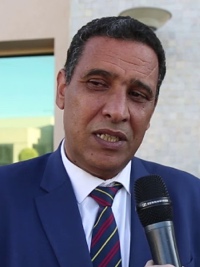
 Dr Ramatsemela Masango is the Director of Mzesi Energy (Pty) Ltd, a company appointed as the Technical Support Organisation of the National Nuclear Regulator in South Africa. Dr Masango is also a Director of ArioGenix, an engineering and project management company in the energy, mining, and defence sectors as well as Ario MetaPower, which develops microgrid systems for the renewable energy sector.
Dr Ramatsemela Masango is the Director of Mzesi Energy (Pty) Ltd, a company appointed as the Technical Support Organisation of the National Nuclear Regulator in South Africa. Dr Masango is also a Director of ArioGenix, an engineering and project management company in the energy, mining, and defence sectors as well as Ario MetaPower, which develops microgrid systems for the renewable energy sector. Catherine Mwaba completed her undergraduate training in 1997, obtaining a medical diploma from the St Petersburg Pediatric Medical Academy. In 2007, she graduated from Witwatersrand University with a fellowship in Radiation Oncology from the College of Medicine of Radiation Oncologists of South Africa.
Catherine Mwaba completed her undergraduate training in 1997, obtaining a medical diploma from the St Petersburg Pediatric Medical Academy. In 2007, she graduated from Witwatersrand University with a fellowship in Radiation Oncology from the College of Medicine of Radiation Oncologists of South Africa. Sheila Frimpong is currently pursuing a Ph.D. at the University of Ghana Business School, she holds an MBA in Marketing from the Ghana Institute of Management and Public Administration. Sheila is a member of the Chartered Institute of Marketing (CIM) Ghana and the Institute of Public Relations (IPR) Ghana.
Sheila Frimpong is currently pursuing a Ph.D. at the University of Ghana Business School, she holds an MBA in Marketing from the Ghana Institute of Management and Public Administration. Sheila is a member of the Chartered Institute of Marketing (CIM) Ghana and the Institute of Public Relations (IPR) Ghana. Odile Fernande ZEH is a Professor of Radiology, Radiodiagnostics, and Medical Imaging at the Faculty of Medicine and Biomedical Sciences, University of Yaounde I in Cameroon. Holding the position of Vice-Dean in charge of Research and Cooperation at the same institution, they also serve as the Head of the Medical Imaging and Radiotherapy Department and the Teaching Unit. Additionally, they are the CADMEF Focal Point and a Radiologist in the Radiology and Medical Imaging Department at the Yaounde Obstetrics and Paediatrics Hospital, where they also hold the position of Head of the Radiology and Medical Imaging Department.
Odile Fernande ZEH is a Professor of Radiology, Radiodiagnostics, and Medical Imaging at the Faculty of Medicine and Biomedical Sciences, University of Yaounde I in Cameroon. Holding the position of Vice-Dean in charge of Research and Cooperation at the same institution, they also serve as the Head of the Medical Imaging and Radiotherapy Department and the Teaching Unit. Additionally, they are the CADMEF Focal Point and a Radiologist in the Radiology and Medical Imaging Department at the Yaounde Obstetrics and Paediatrics Hospital, where they also hold the position of Head of the Radiology and Medical Imaging Department. Professor Solofoarisina is a Docteur HDR in Nuclear Energy and High Energy Physics and a Lecturer at the University of Madagascar. He is also a Managing Director at the Institut National des Sciences et Techniques Nucléaires de Madagascar (INSTN-Madagascar) and the Vice-Chairman of the association CREE (Cercle de réflexion sur l’Etudes des Energies).
Professor Solofoarisina is a Docteur HDR in Nuclear Energy and High Energy Physics and a Lecturer at the University of Madagascar. He is also a Managing Director at the Institut National des Sciences et Techniques Nucléaires de Madagascar (INSTN-Madagascar) and the Vice-Chairman of the association CREE (Cercle de réflexion sur l’Etudes des Energies).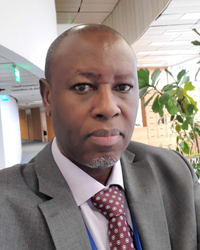 Prof. James Kahindi serves as the Vice Chancellor and Professor of Microbiology at Pwani University (PU). He holds a Ph.D. in Microbiology from the University of Sussex, with an M.Sc. in Botany (Microbiology) and a B.Sc. in Botany and Zoology from the University of Nairobi. With a career spanning since 1984, he has engaged in lecturing and research.
Prof. James Kahindi serves as the Vice Chancellor and Professor of Microbiology at Pwani University (PU). He holds a Ph.D. in Microbiology from the University of Sussex, with an M.Sc. in Botany (Microbiology) and a B.Sc. in Botany and Zoology from the University of Nairobi. With a career spanning since 1984, he has engaged in lecturing and research. Dr. Ignace Gatare is currently the Principal of the College of Science and Technology in the University of Rwanda (UR-CST). Prior to this appointment, he served as the Director General of the Rwanda National Commission of Science and Technology (NCST), a public institution serving as think-tank and advisory board to the Rwanda Government on issues pertaining to the development of science, technology, research and innovation. He also served in the Government of Rwanda as Minister in Charge of Information and Communications Technology, from November 2009 until April 2012.
Dr. Ignace Gatare is currently the Principal of the College of Science and Technology in the University of Rwanda (UR-CST). Prior to this appointment, he served as the Director General of the Rwanda National Commission of Science and Technology (NCST), a public institution serving as think-tank and advisory board to the Rwanda Government on issues pertaining to the development of science, technology, research and innovation. He also served in the Government of Rwanda as Minister in Charge of Information and Communications Technology, from November 2009 until April 2012.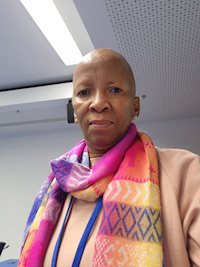 Dr. Boitumelo Stokie Motswagole graduated with a Ph.D. in Human Nutrition from North West University (Potchefstroom Campus) in 2010, with a focus on body composition in black South African children. She is recognized as an expert in body composition assessment using stable isotopes by the International Atomic Energy Agency (IAEA). Dr. Motswagole earned her Master's in International Nutrition from the University of Aberdeen in 1999.
Dr. Boitumelo Stokie Motswagole graduated with a Ph.D. in Human Nutrition from North West University (Potchefstroom Campus) in 2010, with a focus on body composition in black South African children. She is recognized as an expert in body composition assessment using stable isotopes by the International Atomic Energy Agency (IAEA). Dr. Motswagole earned her Master's in International Nutrition from the University of Aberdeen in 1999. Dr. Lydia Ndinelao Horn is a research coordinator at the Zero Emission Research Initiative, part of the Multidisciplinary Research Services at the University of Namibia. Holding a Ph.D. in Plant Breeding from the University of KwaZulu-Natal, her expertise lies in crop improvement using nuclear science and technology.
Dr. Lydia Ndinelao Horn is a research coordinator at the Zero Emission Research Initiative, part of the Multidisciplinary Research Services at the University of Namibia. Holding a Ph.D. in Plant Breeding from the University of KwaZulu-Natal, her expertise lies in crop improvement using nuclear science and technology.